
Mina Shum is an independent Canadian filmmaker. She is a writer and director of award-winning feature films, numerous shorts and has created site specific installations and theatre. Her features, Double Happiness and Long Life, Happiness & Prosperity both premiered in the US at the Sundance Film Festival and Double Happiness won the Wolfgang Staudte Prize for Best First Feature at the Berlin Film Festival and the Audience Award at Torino. She was director resident at the Canadian Film Centre in Toronto. She was also a member of an alternative rock band called Playdoh Republic.

Shek Wing-cheung, better known by his stage name Shih Kien, Sek Kin, or Sek Gin or Shek Kin(Chinese: 石堅; pinyin: Shí Jiān; Jyutping: Sek6 Gin1), was a Hong Kong–based Chinese actor and martial artist. Shih is best known for playing antagonists and villains in several early Hong Kong wuxia and martial arts films that dated back to the black-and-white period, and is most familiar to Western audiences for his portrayal of the primary villain, Han, in the 1973 martial arts film Enter the Dragon, which starred Bruce Lee.
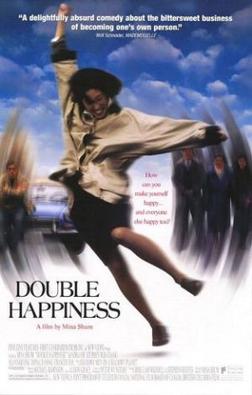
Double Happiness is a 1994 Canadian drama film directed by Mina Shum, co-produced by the National Film Board of Canada. The film stars Sandra Oh as Jade Li, an actress struggling to assert her independence from the expectations of her Chinese Canadian family. Callum Keith Rennie also stars as Mark, Jade's love interest.
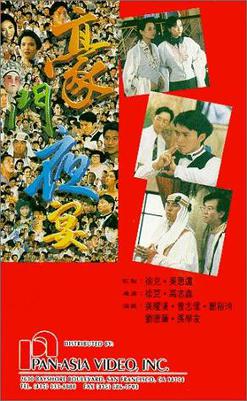
The Banquet, also known as Party of a Wealthy Family, is a 1991 Hong Kong comedy film. It was quickly filmed for a Hong Kong flood relief charity, after the Yangtze River flooded in July of that year, killing over 1,700 people and displacing many more in the eastern and southern regions of mainland China.

The House of 72 Tenants (七十二家房客) is a 1973 Hong Kong film directed by Chor Yuen. It is a remake of a 1963 Chinese film of the same name. It was the top box office film of 1973 in Hong Kong, surpassing Bruce Lee's Enter the Dragon.
Ann Marie Fleming is an independent Canadian filmmaker, writer, and visual artist. She was born in Okinawa, USCAR, in 1962 and is of Chinese, Ryukyuan and Australian descent. Her film Window Horses was released in 2016.

The Magnificent Ruffians is a 1979 Hong Kong martial arts film directed by Chang Cheh and starring the Venom Mob.

Legend of the Fox, also known as Legend of a Fox, is a 1980 Hong Kong film based on Louis Cha's novel The Young Flying Fox. It was produced by the Shaw Brothers Studio, directed by Chang Cheh and starred the Venom Mob. The film used to be one of the most rare Venom Mob martial arts film available, but has been digitally remastered and released by Celestial Pictures.
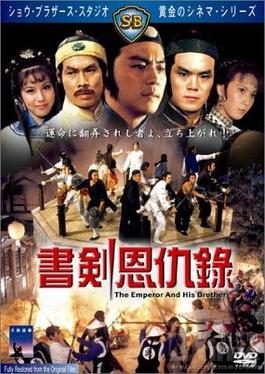
The Emperor and His Brother is a 1981 Hong Kong wuxia film based on Louis Cha's novel The Book and the Sword. Produced by the Shaw Brothers Studio, the film was directed by Chor Yuen and starred Ti Lung, Jason Pai and Lo Lieh in the leading roles.

Abbot of Shaolin (少林英雄榜) aka Shaolin Abbot aka Slice of Death is a Shaw Brothers film directed by Ho Meng Hua. It is a Shaolin Temple-themed martial arts film about their rebellion against the Qing, featuring David Chiang and Lo Lieh as Priest Pai Mei.
Golden Chicken 2 is a 2003 Hong Kong film directed by Samson Chiu. It is a sequel to the 2002 Golden Chicken.

All's Well, Ends Well 2009 or abbreviated as AWEW 2009 is a 2009 Hong Kong romantic comedy film directed by Vincent Kok. It is the fourth instalment in the All's Well, Ends Well film series, the previous film being All's Well, Ends Well 1997.
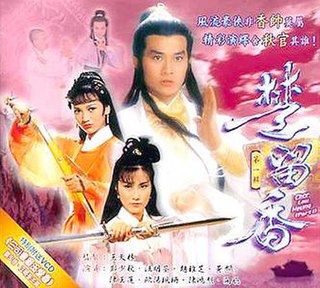
Chor Lau-heung is a Hong Kong wuxia television series adapted from the first three novels in the Chu Liuxiang novel series by Taiwanese writer Gu Long. Adam Cheng starred as the titular protagonist, Chor Lau-heung. The series was first broadcast on TVB on September 3, 1979. The 65 episodes long series was divided into four parts: The Legend of Mo-fa (無花傳奇), The Great Desert (大沙漠), Legend of the Divine Palace (神宮傳奇) and The Final Battle (最後一戰).
Drive, She Said is a 1997 Canadian film by Mina Shum, starring Moira Kelly, Sebastian Spence and Josh Hamilton.

Stephen Hegyes is a Canadian film producer, associated with several films, including Double Happiness and White Noise.

Great Pretenders is a 1991 Hong Kong comedy film edited and directed by Ronny Yu and starring Raymond Wong, Tony Leung, Simon Yam and Amy Yip.

A Hearty Response is a 1986 Hong Kong romantic comedy and action thriller film directed by Norman Law and starring Chow Yun-fat, Joey Wong and David Lui.
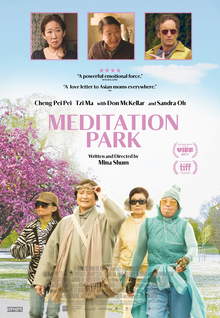
Meditation Park is a 2017 Canadian drama film directed by Mina Shum. The film opened the 2017 Vancouver International Film Festival and was screened in the Contemporary World Cinema section at the 2017 Toronto International Film Festival. Following in the footsteps of her previous work like Double Happiness, Meditation Park highlights director Shum's Chinese ancestry. Notably, the film highlights stars Sandra Oh and Don McKellar. Shum's Meditation Park questions traditional gender roles and reveals difficulties associated with the immigrant experience. It debuted to positive reviews at the Toronto International Film Festival and opened in selected theatres on 9 March 2018.
Benjamin Immanuel is a Canadian actor, film director and screenwriter. He is most noted for his performances in the films Last Wedding and Looking for Leonard.















